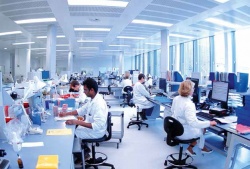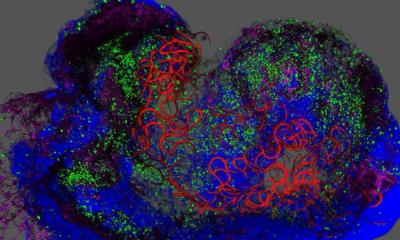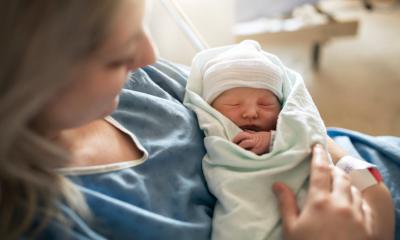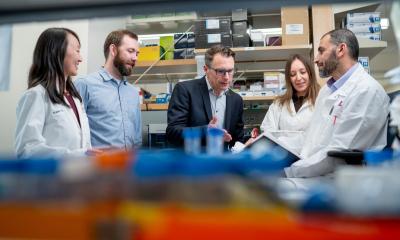Under the microscope: Embryos are monitored minute by minute
Fathers as well as mothers provide a fertile field of study for Unilabs-Eylau Centre for Assisted Reproduction in Paris


You may have seen the results of Eylau Laboratories work – a happy couple holding a miracle, their newborn baby, or perhaps walking a toddler in a park – without realising the connection. For behind the parents’ joy lies a history of anguish before the child could be born.
Regularly, in medical journals, the Eylau Laboratories publishes articles describing the techniques used to assist would-be parents to realise their dream of creating a child. The people from all backgrounds, from ordinary to famous, pass discretely through Paris seeking the services of the Eylau Centre for Assisted Reproduction, which since 1954 has built an international reputation in the field of assisted reproductive medicine and in-vitro fertilisation. Each day more than 180 hormonal or semen analyses are conducted at the Eylau facilities for couples referred by their physician, or those who have found the clinic on their own through recommendations of friends, or increasingly, social media. Over 5,000 in-vitro fertilisation procedures are performed each year, and the number of analyses at Eylau surpasses the combined volume of private and public clinics in France. The centre also performs highly advanced tests from profiling of the viability of sperm and eggs to a minute- by-minute monitoring of embryo development.
‘We present a global solution for couples to explore the causes of infertility, and then propose a full palette of techniques and tools that can be applied to bring the best possible result,’ said Thierry Leclerc, vice-president for Unilabs-France who is responsible for the reproductive medicine operations of Eylau Laboratories. Eylau clinicians and scientists are on the leading edge of infertility studies, drawing more than 200 participants every year to the conference updates in infertility, which features their research.
The group publishes between 10 and 15 papers each year, said Leclerc, ‘not fundamental research or science for the sake of science but resultsbased, applied science focused on obtaining the best results for couples.’ A study from researcher’s at Unilabs’ Eylau Centre for Assisted Reproduction made headlines internationally last year reporting at the congress of the European Society of Human Reproduction in Stockholm that a study of nearly 2,000 young, obese men showed they had a higher chance of producing infertile sperm than men of normal weight.
It was the largest study of its type ever conducted according to the scientific director of Eylau-Unilabs, Paul Cohen-Bacrie MD, who added that, while the risk of infertility for overweight women had been established, there had been less evidence about the impact of obesity on men. Leclerc said the statistical strength of Eylau studies for reproductive medicine comes from the fact that the specialised services of the Centre for Assisted Reproduction are part of the larger operation of Unilabs-Eylau that conducts more traditional laboratory analysis.
More complete and comprehensive analyses across a larger population enable findings to be carefully corroborated. Eylau researchers and clinicians also take a more comprehensive view of problems of infertility, including especially a close examination of the father. Studies by researchers from Eylau, for example, established that men have a biological clock as well as women, showing that there was a decrease in pregnancy rates from 12.3% with fathers 30 years of age or younger to 9.3% in fathers older than 45 years of age. Miscarriage rates also increased where the father was over 35. Eylau was the first in France, and among the pioneers in Europe, to directly introduce morphologically selected sperm into the oocyte, greatly increasing the success rate for couples affected by infertility.
The centre also utilises the newest technology, an embryoscope, an image capture system that allows an enormous amount of specific and objective information to be collected for each embryo from the moment of in vitro fertilisation. Monitoring the dynamics of a developing embryo aids clinicians in identifying the most viable candidate to be transferred into the uterus. Genetic profiling of embryos is highly controversial in assisted reproduction for ethical and moral reasons. Yet genetic profiles of the sperm or ova before fertilisation, called karyotyping, responds to essential clinical questions of reproductive biology. In 2008 the Eylau centre opened a genetics unit that serves the wider Unilabs network. The European scope of the larger Unilabs group across 11 countries represents a significant opportunity for expanding the specialised services of the Eylau Centre for Assisted Reproduction. Currently, Thierry Leclerc added, Unilabs is studying the potential to establish a reproductive medicine group within a larger laboratory operation in Spain.
05.11.2012





